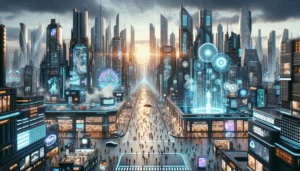A Brave New World: AI as a Nascent Regime?
By: Jasmin Cowin, Birgit Oberer, and Cristo León
Blog post about the article by Cowin, Oberer, and León (2023) published in the Journal of Systemics, Cybernetics and Informatics, last updated on September 12, 2023.
Introduction
This transdisciplinary essay draws parallels between Aldous Huxley’s Brave New World and the rise of Generative Artificial Intelligence and Large Language Models (LLMs). It examines how algorithmic systems may reshape human expression, emotional life, and social order. By interpreting AI’s rapid integration through a literary and ethical lens, the authors question whether we are entering a new regime defined by efficiency, uniformity, and corporate control—where creativity and individuality risk being subsumed by automated structures of meaning.
Core Discussion
The article investigates how AI can simultaneously empower and constrain humanity. It addresses linguistic homogenization, emotional flattening, and the potential erosion of diverse cultural voices under algorithmic optimization. Drawing from transdisciplinary dialogue across humanities, technology, and governance, it calls for a collective effort to maintain human autonomy while navigating technological determinism. The piece argues that true progress requires a balance between innovation and ethics—between Huxley’s cautionary vision and AI’s transformative promise.
Key Themes
- AI and linguistic homogenization as new forms of social control.
- Emotional experience and human autonomy in algorithmic systems.
- Ethical governance and democratic responsibility in AI development.
- Huxley’s dystopia as a mirror for contemporary technological determinism.
- Transdisciplinary reflection on ethos, logos, and pathos in the age of automation.
Broader Impact
This reflection serves as both a warning and a manifesto: to guide AI development toward enhancing human diversity, empathy, and shared meaning. The authors advocate for policies and educational frameworks that prioritize critical literacy, emotional intelligence, and social responsibility in the use of generative technologies. By engaging across disciplines, societies can ensure that AI remains a tool for liberation rather than a nascent regime of algorithmic conformity.
Cite this Paper
Cowin, J., Oberer, B., & León, C. (2023). A Brave New World: AI as a Nascent Regime?
Journal of Systemics, Cybernetics and Informatics, 21(4), 58–66.
https://doi.org/10.54808/JSCI.21.04.58
DOI: 10.54808/JSCI.21.04.58
ISSN: 1690-4524
Volume: 21 | Issue: 4 | Pages: 58–66
Series: Associated with the plenary keynote addresses of 2023
Publisher: International Institute of Informatics and Cybernetics (IIIC)
Rights: Copyright © 2003–2024 IIIC. All rights reserved.
Keywords: Ethics; Transdisciplinary; AI Governance; Large Language Models (LLM); Communication; Convergence; Human Autonomy; Algorithmic Control; Emotional Experience; Literary Critique; Brave New World; Identity; Technological Determinism
Interested in Exploring or Collaborating?
Are you studying the intersection of AI, ethics, and human expression?
Share this post, or cite the article to join the dialogue on transdisciplinary approaches to AI and humanity.
Versión en Español
Un Mundo Feliz: La IA como Régimen Naciente
Entrada de blog sobre el artículo de Cowin, Oberer y León (2023) publicado en el Journal of Systemics, Cybernetics and Informatics.
Introducción
Este artículo transdisciplinario establece paralelos entre la visión distópica de Aldous Huxley en Un Mundo Feliz y la era actual dominada por la Inteligencia Artificial Generativa y los Modelos de Lenguaje Extensos (LLM). Examina cómo la IA puede influir en el comportamiento humano, homogeneizar el lenguaje y reconfigurar las normas sociales, advirtiendo sobre el riesgo de una pérdida de diversidad y autonomía en favor de la eficiencia y el control algorítmico.
Temas Clave
- Homogeneización lingüística y control social algorítmico.
- Autonomía humana y experiencia emocional frente a la automatización.
- Gobernanza ética y responsabilidad democrática en el desarrollo de la IA.
- La distopía de Huxley como espejo de la era tecnológica contemporánea.
- Reflexión transdisciplinaria sobre el ethos, logos y pathos en la era de la IA.
Cita el artículo
Cowin, J., Oberer, B., y León, C. (2023). Un Mundo Feliz: La IA como Régimen Naciente.
Journal of Systemics, Cybernetics and Informatics, 21(4), 58–66.
https://doi.org/10.54808/JSCI.21.04.58
Podcast
🎧 Escucha el podcast (duración: [X:XX] minutos)

